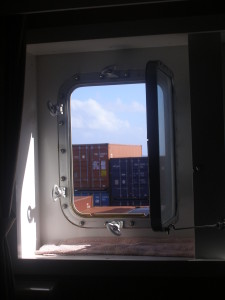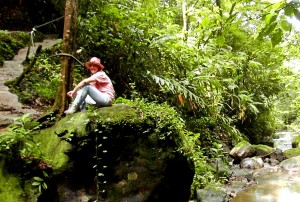This essay first appeared on Allyson Latta’s www.allysonlatta.com, Memoir Writing and More. Reprinted with permission.
In the roomy bottom drawer of my desk are three generations of travel journals, my grandmother’s, my mother’s, and mine.
My grandmother’s are strictly reportorial: “Spent entire day in my room with diarrhea. Missed tour of Santa Maria Novella.” My mother’s style is livelier and more descriptive: “Went to Les Halles at 3 AM and had some onion soup, along with a couple of glasses of brandy, and then irresistibly bought an entire crate of the most beautiful peaches.”
For years my mother kept the ship’s logs as she and my father knocked around in small yachts. These make pretty dry reading — position, wind, currents — but every once a while something interesting happens, the anchor dragging in the middle of the night, the dinghy painter separating mysteriously from its cleat, and these call forth my mother’s seemingly endless talent for limericks, small bright “literary” moments of sheer entertainment.
My own journal style has tended to follow my mother’s and I have found that describing things adds immeasurably to the pleasure of travel. I never wrote specifically for entertainment, however, until I took a forty-nine-day freighter voyage around the South Pacific.
“But what are you going to do all day?” my friends asked.
“Write about it, of course. You want to be on the mailing list?”
And as I sailed along I set about writing my first full-length travel manuscript, Letters from the Pacific: Forty-Nine Days on a Cargo Ship. The original idea had been simply to describe what was happening and send it back to friends and family in installments whenever I got to an Internet café in port. But very early in the voyage it became clear that I was taking this trip for a lot of reasons that had nothing to do with adventure, and I started working on a parallel journal, my feelings opening up in the presence of all that wide, wild, empty ocean.
I began to discover the power of memoir — and the fact that travel, removing yourself bodily from your daily life for extended periods of time, offers a wonderful opportunity for reflection and truth-telling.
It also offers the perfect chance to practice one’s writing.
Description:
Cruising along the north coast of Honduras at 257˚, west by south, at 11.5 knots, winds so light that the sea looks wrinkled like the skin of a pachyderm. A torpid haze hangs over us, deadening the light, turning the nearby Bay Islands into amorphous humps rising out of oblivion.
Characterization:
The Captain’s Dinner Diatribe tonight wound up with, “Media, politics, all just a circus.” He took a forkful of salad and then looked at us both intently over the rims of his glasses. “Like the Romans — give them bread, give them circus. Keep the people happy.”
“But, Captain, you’re so cynical!” I protested.
“And the world is not cynic? What about Iraq and the so-called weapons of mass destruction? Three days after invasion they are saying, no weapons of mass destruction. That is not cynic?”
I countered, “The western powers were supporting Saddam Hussein for years. I would call that invasion hypocritical.”
“And what means hypocrite?” Rodolfo and I were obviously expected to wait for the answer. “Hypocrite, Greek, it means actor.” And he lifts his hands from the table, palms up, in that international gesture, What more to say?
Humor:
The morning after my first night in the room, I reported to the Signora the foul emanations of sewer gases from the bathroom. Unable to sleep, I had sniffed around until I identified the shower drain, no doubt squeezed into the old building without a trap. I threw a towel over it and went back to bed. The Signora told me that “these smells always occur in the bad weather,” and then she suggested that next time I use a wet towel. I recognized in her insouciance about the plumbing something wonderfully familiar, and it felt just like home.
Reflection:
It’s incredible to me to be passing Morocco, Algeria, and Tunisia in my transit to Malta, these places having been nothing more for me than bad news in the daily paper. Now the shadow of the coast, sometimes visible, sometimes not, haunts me, because I know I’ll never go there and its mysteries will remain forever locked in the realms of fantasy and horror. Incredible also are the stars; we are somewhere around the thirty-ninth parallel, not that far south of where I grew up and lived half of my adult life. Could it be that this is the same nighttime sky?
Travelling is a little like losing your identity; everything familiar that defines who you are is gone and you open up more fully to your surroundings, emptying yourself of the quotidian so as to fill yourself with the new and strange. In such open-hearted states experience becomes more intense, and this lends great power to the pen. Somewhere I read a quotation that I wish I could ascribe: “Great stories happen to the people who can tell them.”
Someone asked me recently where I ever acquired the dream of freighter travel, and I couldn’t pinpoint it. I love the ocean, certainly — many happy times spent on small boats, and the romantic idea that must be hidden away in some nook in our culture, of climbing on board a freighter and writing a book, destinations be damned. And I had always loved tales of ships and the sea. If you have read any of that rich literature (Conrad, Melville, Dana), you know that there’s plenty to describe out there in the middle of nowhere: people, conversations, subtleties of relationships in close quarters, movements of the ship, weather, and the ever-changing sea and sky.
One freighter voyage was not enough, as it turned out, and my latest voyage took me to Europe. While the first had not been at all about destinations (more like jumping off a cliff), the second one was; there were a few people I wanted to see and things I felt I had to do before a looming major surgery that might have made any future such trip impossible. Facing my increasing physical disability made this trip a great deal more poignant, and I determined that it would be an active search for the joie de vivre.
So this time I was writing with a special purpose, and that was to focus on all the things that gave me joy: the vivid colors of a fishing boat in Malta, the first taste of a seafood ravioli on the Italian coast, the silky perfection of a Michelangelo sculpture, sharing a day in a remote Alpine village with the family of a dear friend, holding my sister’s hand in Paris as we both felt the tones of an 18th-century cello pierce our hearts … There was all this and so much more, and I realized that writing about it helped me to find what I was looking for.
Excerpts from the unpublished travel memoir, Journey to the Joie de Vivre
©Sandra Shaw Homer, 2014






